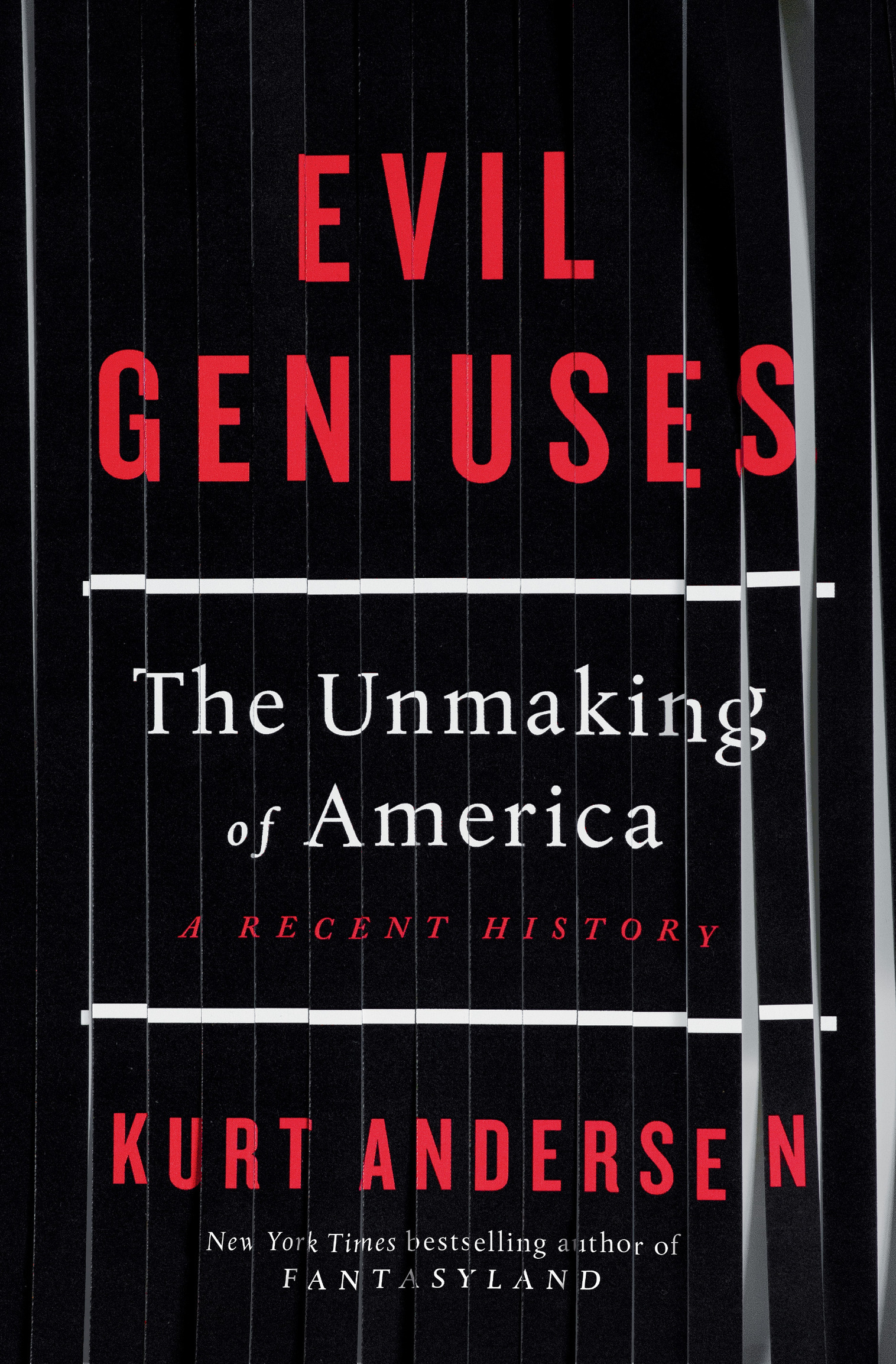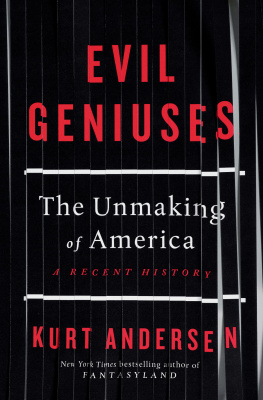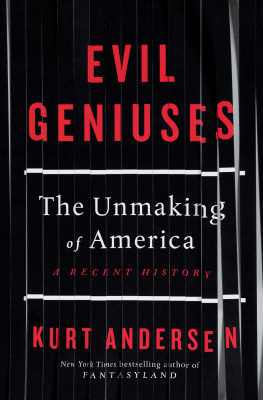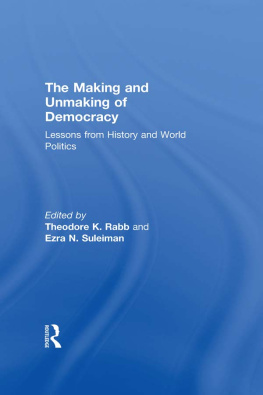Kurt Andersen - The Unmaking of America: A Recent History
Here you can read online Kurt Andersen - The Unmaking of America: A Recent History full text of the book (entire story) in english for free. Download pdf and epub, get meaning, cover and reviews about this ebook. year: 2020, publisher: Random House Publishing Group, genre: Politics. Description of the work, (preface) as well as reviews are available. Best literature library LitArk.com created for fans of good reading and offers a wide selection of genres:
Romance novel
Science fiction
Adventure
Detective
Science
History
Home and family
Prose
Art
Politics
Computer
Non-fiction
Religion
Business
Children
Humor
Choose a favorite category and find really read worthwhile books. Enjoy immersion in the world of imagination, feel the emotions of the characters or learn something new for yourself, make an fascinating discovery.
- Book:The Unmaking of America: A Recent History
- Author:
- Publisher:Random House Publishing Group
- Genre:
- Year:2020
- Rating:3 / 5
- Favourites:Add to favourites
- Your mark:
- 60
- 1
- 2
- 3
- 4
- 5
The Unmaking of America: A Recent History: summary, description and annotation
We offer to read an annotation, description, summary or preface (depends on what the author of the book "The Unmaking of America: A Recent History" wrote himself). If you haven't found the necessary information about the book — write in the comments, we will try to find it.
The Unmaking of America: A Recent History — read online for free the complete book (whole text) full work
Below is the text of the book, divided by pages. System saving the place of the last page read, allows you to conveniently read the book "The Unmaking of America: A Recent History" online for free, without having to search again every time where you left off. Put a bookmark, and you can go to the page where you finished reading at any time.
Font size:
Interval:
Bookmark:


Copyright 2020 by Kurt Andersen
All rights reserved.
Published in the United States by Random House, an imprint and division of Penguin Random House LLC, New York.
R ANDOM H OUSE and the H OUSE colophon are registered trademarks of Penguin Random House LLC.
Some passages in Evil Geniuses were originally published in a different form in Vanity Fair.
LIBRARY OF CONGRESS CATALOGING-IN-PUBLICATION DATA
Names: Andersen, Kurt, author.
Title: Evil geniuses : the unmaking of America : a recent history / by Kurt Andersen.
Description: New York : Random House, [2020] | Includes bibliographical references and index.
Identifiers: LCCN 2020017081 (print) | LCCN 2020017082 (ebook) | ISBN 9781984801340 (hardcover) | ISBN 9781984801364 (ebook)
Subjects: LCSH: WealthPolitical aspectsUnited StatesHistory. | Big businessUnited StatesHistory. | Corporate powerUnited StatesHistory. | DemocracyUnited StatesHistory. | United StatesEconomic conditions. | United StatesSocial condtions. | United StatesPolitics and government.
Classification: LCC HC110.W4 A53 2020 (print) | LCC HC110.W4 (ebook) | DDC 330.973dc23
LC record available at https://lccn.loc.gov/2020017081
LC ebook record available at https://lccn.loc.gov/2020017082
Ebook ISBN9781984801364
randomhousebooks.com
Book design by Susan Turner, adapted for ebook
Cover design: Pete Garceau
ep_prh_5.5.0_c0_r0
We must make our choice. We may have democracy, or we may have wealth concentrated in the hands of a few, but we cant have both.
L OUIS B RANDEIS
The crisis consists precisely in the fact that the old is dying and the new cannot be born; in this interregnum a great variety of morbid symptoms appear.
A NTONIO G RAMSCI
Strategic inflection pointscan mean an opportunity to rise to new heights. But it may just as likely signal the beginning of the end.
A NDY G ROVE
When you reach your fifties, it gets easier to notice the big ways in which the world has or hasnt changed since you were young, both the look and feel of things and peoples understandings of how society works. A half-century of life is enough to provide some panoramic perspective, letting you see and sense arcs of history firsthand, like when an airplane reaches the altitude where the curvature of the Earth becomes visible.
Some of the arcs of historical change are obvious, their paths as well as their causes. The equality and empowerment of women is one of those big duh ones. But other important historical arcs, more complicated or obscure, have to be figured out.
Thats how I came to write my last nonfiction book, a not-so-obvious American history called Fantasyland: How America Went Haywire. Id noticed that in so many ways, as Stephen Colbert joked on the first episode of his old nightly show, America had become increasingly divided between those who think with their head and those who know with their heart. From the 1960s and 70s on, I realized, America had really changed in this regard. Belief in every sort of make-believe had spun out of controlin religion, science, politics, and lifestyle, all of them merging with entertainment in what I called the fantasy-industrial complex. In that book I explained the deep, centuries-long history of this American knack for creating and believing the excitingly untrue. As soon as I finished writing Fantasyland, we elected a president who was its single most florid and consequential expression ever, a poster boy embodying all its themes.
But that long-standing, chronic American condition that turned into an acute crisis is just half the story of how and why weve come to grief these last few decades. This other part concerns the transformation of our social system that started in the 1970s and 80s, helped along by a simultaneous plunge into compulsive nostalgia and wariness of the new and unfamiliar. Whereas Fantasyland concerned Americans centuries-old weakness for the untrue and irrational, and its spontaneous and dangerous flowering since the 1960s, Evil Geniuses chronicles the quite deliberate reengineering of our economy and society since the 1960s by a highly rational confederacy of the rich, the right, and big business.
From my parents young adulthood in the 1930s and 40s through my young adulthood in the 1970s, American economic life became a lot more fair and democratic and secure than it had been when my parents were children in the 1920s and early 30s. But then all of a sudden around 1980, that progress slowed, stopped, and in many ways reversed.
I didnt start fully appreciating and understanding the nature and enormity of that change until the turn of this century, after the country had been transformed. In 2002, when several spectacular corporate financial frauds were exposed and their CEO perpetrators prosecuted, I published a long screed in TheNew York Times blaming Wall Street. If infectious greed is the virus, New York is the center of the outbreak, I wrote, because it
is also, inarguably, the money center of America and the world, the capital of capitalism.It was New York investment bankers who drove the mergers-and-acquisitions deal culture of the 80s and 90s and who most aggressively oversold the myth of synergy that justified it.It was theywho invented the novel financial architectures of Enron and WorldCom. It was the example of New York investment bankers, earning gigantic salaries for doing essentially nothingknowing the right people, talking smoothly, showing up at closingsthat encouraged businesspeople out in the rest of America to feel entitled to smoke-and-mirrors cash bonanzas of their own.
A few years later, one very cold morning just after Thanksgiving, I had another slow-road-to-Damascus moment from whatever I had been (complacent neoliberal?) to whatever I was becoming (appalled social democrat?). I was actually on the road to Eppley Airfield in Omaha after my first visit to my hometown since both my parents had died, sharing a minivan jitney from a hotel with a couple of Central Casting airline pilotstall, fit white men around my age, one wearing a leather jacket. We chatted. To my surprise, even shock, both of them spent the entire trip sputtering and whiningabout being baited and switched when their employee ownership shares of United Airlines had been evaporated by its recent bankruptcy, about the default of their pension plan, about their CEOs recent 40 percent pay raise, about the company to which theyd devoted their entire careers but no longer trusted at all. In effect, about changing overnight from successful all-American middle-class professionals whod worked hard and played by the rules into disrespected, cheated, sputtering, whining chumps.
When we got to the airport, I said goodbye and good luck and, at the little bookstore there that contains a kind of shrine to the local god Warren Buffett and his company Berkshire Hathaway, bought a newspaper. In it I read an article about that years record-setting bonuses on Wall Street. The annual revenues of Goldman Sachs were greater than the annual economic output of two-thirds of the countries on Eartha treasure chest from which the firm was disbursing the equivalent of $69 million to its CEO and an average of $800,000 apiece to
Font size:
Interval:
Bookmark:
Similar books «The Unmaking of America: A Recent History»
Look at similar books to The Unmaking of America: A Recent History. We have selected literature similar in name and meaning in the hope of providing readers with more options to find new, interesting, not yet read works.
Discussion, reviews of the book The Unmaking of America: A Recent History and just readers' own opinions. Leave your comments, write what you think about the work, its meaning or the main characters. Specify what exactly you liked and what you didn't like, and why you think so.












